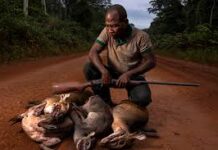
By By Anthony Stephens and Evelyn Kpadeh Seagbeh, New Narratives Justice Reporters
The trial of Kunti Kamara, a former battlefront commander for the United Liberation Movement of Liberia, began Monday at the French Court of Appeals for crimes against humanity, torture and acts of barbarism allegedly committed in Liberia between 1993 and 1994.
Known as “Kunti-K” among other war names, the 48-year-old is being prosecuted under the legal principle of universal jurisdiction, which says that crimes committed against all of humanity know no borders and can be tried anywhere in the world.
In an early phase of the investigation Kamara denied all the allegations.
“I will continue to prove that these people are criminals in Liberia and that there are people behind them in Liberia; someone is manipulating them to prosecute me,” he told investigating judges according to the indictment. “Everyone will be able to tell you I am innocent.”
But Kamara admitted to being a commander of two sections of ULIMO rebels. He also allegedly admitted reporting to a commander called “Deku” and another called “Mohammed Tumuyah”. He said he joined ULIMO because he wanted to defend himself against Charles Taylors’ National Patriotic Front of Liberia forces.
The trial will last four weeks and will hear from more than three dozen witnesses and experts including many who have been brought here from Liberia by the French prosecution team. It is expected Kamara will testify on his own behalf. Alieu Kosiah, Kamara’s ULIMO ally who is appealing his own war crimes conviction by a court in Switzerland last year, will also testify. Kamara upended Kosiah’s defense case when he appeared as a defense witness and testified that Kosiah had committed the crimes for which he was accused. His testimony shocked the defense. The prosecution and civil parties said it was crucial to the success of their case.
The case is being brought by France’s Anti-Terrorist unit within the public prosecutor’s office. Until now the unit has only tried cases related to the 1994 Rwandan genocide. France had a strong presence in Rwanda in the colonial period. This is the first time in France that a trial has been held for acts committed in a country other than Rwanda.
Among the many gruesome allegations against Kamara is the torture and murder of one man who was said to have had his elbows tied together behind his back before Kamara cut open his rib cage, removed his heart and ate it. Other charges allege Kamara forced victims to transport goods for ULIMO. There are also allegations of rape and sexual slavery by Kamara and men under his command. The indictment generally alleges Kamara joined in ulimo’s reign of terror of people in Foya.
In Lofa, ULIMO survivors celebrate the trial
In phone calls some alleged victims of Kamara’s crimes told New Narratives/Frontpage Africa that they knew him by his other war name “Co Kundi”. Many named him as responsible for the the 1993 “ngisakornjai” murders in which they said six men— Saah Gborway, Zaza Gbanya, Saah Musa, Augustine Pillo, Tamba Africa (a well know black smith) in Foya, and Tamba Sumnor were allegedly murdered by Kamara’s rebels on his orders.
Victims’ family members said they were pleased to see Kamara face trial in France given successive Liberian governments have refused to hold Liberia’s accused war criminals to account in a war and economics crimes court as recommended by the country’s Truth and Reconciliation Commission.
“Since our own governments have refused to punish these people for the things they did to us during the war, let the international community punish them,” said Evelyn Pillo, who claimed her youngest brother Augustine was among the six men killed in the Ngisakornji murders.
Just as Kosiah’s victims told a team of NN/FPA reporters in 2020, Kunti-K’s alleged victims are calling for the death penalty, or life imprisonment Kamara. France, like all of Europe, has abolished the death penalty.





















